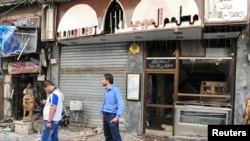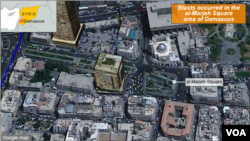CAIRO —
Two suicide bombers struck al-Marjeh Square in the Syrian capital Tuesday, killing at least 14 people and wounding dozens more in the second major attack on the square since the end of April.
The blasts blew off doors and shattered plate glass windows, propelling shrapnel into the air as people headed to work during morning rush hour. Chunks of concrete fell from buildings, and vehicles were crumpled by the force of the explosions.
A young man who ran into a nearby shop described hearing the sound of two bullets just before nine in the morning. He said he inside a shop out of fear just before being shaken by two explosions about 20 seconds apart. Women, children and other innocent bystanders were hurt in the blasts, he said.
Witnesses and Syrian state media said two suicide bombers blew themselves up near a police station.
A shopkeeper said the bombers arrived at the precinct and one fired at the guard at the door, then blew himself up, while the other blew himself up after that. It was a terrorist attack, he said. "The victims were civilian and we lost friends in the blast. It was an evil act."
A doctor at a nearby hospital which treated many of the bomb victims said 28 victims were brought to his hospital, suffering various injuries, including shrapnel wounds to the legs, head, stomach and chest.
The bombings could be a response to the recent government offensive in other parts of the country, said analyst James Denselow.
"If you're the opposition, you have every interest to want to show that [you] are still able to fight back against the regime, and I think car bombs in Damascus are a kind of similar message that they are able to strike inside the most secure areas of the country and that the picture of the regime storming everything in its path is simply not true," he said.
Syrian government forces are reported to be mounting an offensive against rebel-held districts of Aleppo, the country's commercial hub. More than half the city has been under rebel control since July of 2012.
The blasts blew off doors and shattered plate glass windows, propelling shrapnel into the air as people headed to work during morning rush hour. Chunks of concrete fell from buildings, and vehicles were crumpled by the force of the explosions.
A young man who ran into a nearby shop described hearing the sound of two bullets just before nine in the morning. He said he inside a shop out of fear just before being shaken by two explosions about 20 seconds apart. Women, children and other innocent bystanders were hurt in the blasts, he said.
Witnesses and Syrian state media said two suicide bombers blew themselves up near a police station.
A shopkeeper said the bombers arrived at the precinct and one fired at the guard at the door, then blew himself up, while the other blew himself up after that. It was a terrorist attack, he said. "The victims were civilian and we lost friends in the blast. It was an evil act."
A doctor at a nearby hospital which treated many of the bomb victims said 28 victims were brought to his hospital, suffering various injuries, including shrapnel wounds to the legs, head, stomach and chest.
The bombings could be a response to the recent government offensive in other parts of the country, said analyst James Denselow.
"If you're the opposition, you have every interest to want to show that [you] are still able to fight back against the regime, and I think car bombs in Damascus are a kind of similar message that they are able to strike inside the most secure areas of the country and that the picture of the regime storming everything in its path is simply not true," he said.
Syrian government forces are reported to be mounting an offensive against rebel-held districts of Aleppo, the country's commercial hub. More than half the city has been under rebel control since July of 2012.





